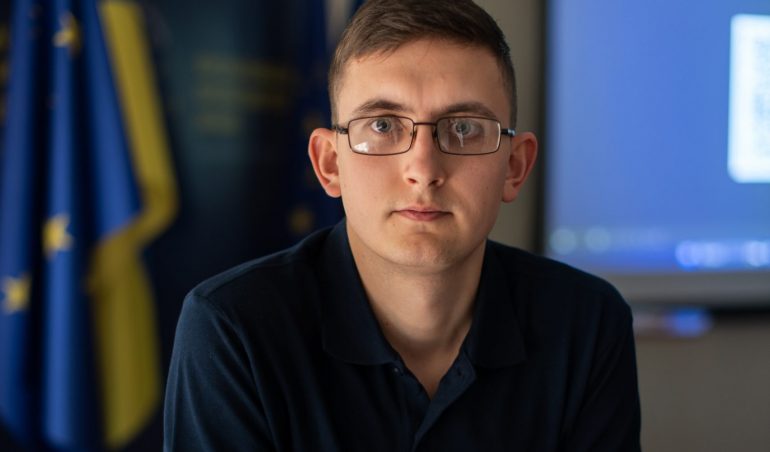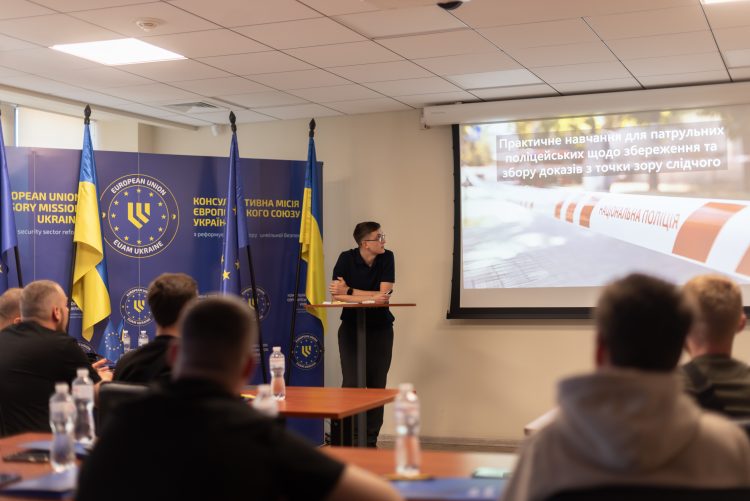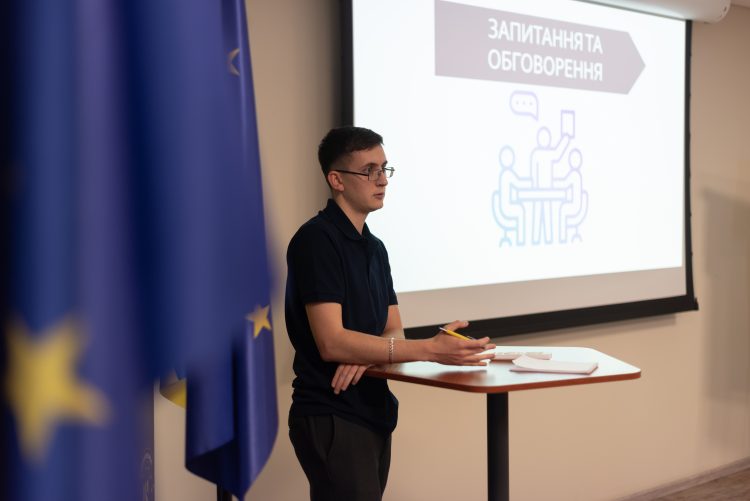“A truly professional officer inspires trust, and that trust, in turn, eases the emotional burden on people in difficult situations”
May 08, 2025
Meet Andrii Shyrokopoias, a 24-year-old investigator from Odesa. Despite his young age, he already has over three years of experience in the field. A few months ago, he joined an EUAM Training of Trainers event. Now, he’s back – not as a participant, but as a speaker, sharing his investigator’s experience with patrol police officers. Using the skills and techniques he gained during the training, he’s helping make the session more engaging and interactive.
We caught him right after the event to ask a few questions.

EUAM: Tell us a bit about yourself. How did you become an investigator, and how long have you been working in this role?
Andrii: My entire family works in either the police or the military, so growing up, I always knew I wanted to join the law enforcement field. It was a childhood dream, and it came true three years ago when I joined the investigators’ department right after graduating from the Ministry of Internal Affairs University in Odesa.
This job isn’t easy, especially during wartime. We’re facing staff shortages, which means I’m often overloaded with work and have very little time for my personal life. But at the same time, I’m doing what I’ve always dreamed of, and that gives me the motivation and energy to keep going.
EUAM: How did you find out about the EUAM Training of Trainers (ToT) event, and why did you decide to take part? What did you take away from the training?
Andrii: My supervisor asked if anyone was interested in joining the training. Since I’ve always been socially active, I saw it as a great opportunity to meet new people and gain new knowledge, skills and experience. That’s how I decided to take part.
This was the first time I’ve ever met police officers from another country. The main focus of the training was on interviewing and interrogating techniques, where our colleagues from the EU shared their practical experience. Another important part was the Training of Trainers (ToT), where we learned how to plan and deliver our own lectures, lessons and training sessions.
EUAM: What new things did you learn during the training?
Andrii: I found the interrogation tactics particularly insightful, especially how an interrogation room should be set up. For example, the positioning of the suspect and the officers during an interrogation. These tactical details are crucial for ensuring the safety of police personnel, and it was something completely new for me. I am sure we need to continue to emphasize the importance of police officers’ safety.
As for the ToT part, I now have a toolkit of techniques on how to build a connection with the audience, how to keep the audience engaged and active. These methods make it easier for participants to absorb and retain new information, which makes the lectures and trainings much more effective. Because if you don’t engage your audience and just keep talking without pauses or interaction, people are likely to lose focus. And if you ask them at the end what they’ve learned, chances are they’ll say – nothing.
EUAM: Today you’ve come to the EUAM Knowledge Hub in Odesa in a new role – not as a participant, but as a speaker. Tell us about the event.
Andrii: I came to the EUAM Knowledge Hub today to contribute to a session on crime scene management. With over three years of experience as an investigator, I’ve seen how easy it is for mistakes to happen in those critical first moments at a crime scene, often by accident. Patrol officers are usually the first on site, and it’s essential they preserve the scene properly until investigators arrive.
Although investigators and patrol officers are partner units, we rarely get dedicated time to exchange perspectives. That’s what made this event especially valuable. I shared insights on crime scene management from the investigator’s point of view, focusing on both the legal framework and tactical procedures involved. I wanted to emphasize that a crime scene inspection isn’t just a box to tick, it’s a key step in building a strong case. Understanding its purpose and following the right protocol can make all the difference in an investigation. Today, I applied the techniques I gained during the ToT training to actively engage the audience. I encouraged them to think critically, reflect on key points, and share their own perspectives on the situations we discussed. This type of engagement allows people to grasp new information more efficiently than merely listening to a lecture or reading from notes.

EUAM: How do you see the future of the police?
Andrii: As part of the new generation of law enforcement, we carry the responsibility for shaping the future. I imagine a future where public trust in the police reaches the same high levels as seen in the European Union. When someone approaches a police officer for help, they should feel 100% confident that they will receive competent support. And it is about clearly explaining what needs to be done, outlining the next steps, offering advice, and providing real assistance. A truly professional officer inspires trust, and that trust, in turn, eases the emotional burden on people in difficult situations.


